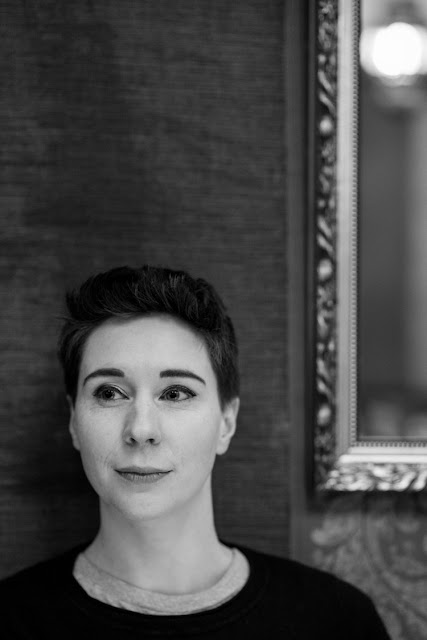Cailean Steed
Cailean Steed is a writer, teacher and aspiring dog owner. Steed lives near Glasgow with their husband and son. They have also resided in Aberdeen and Dublin, and hope one day to live somewhere with less rain.

Steed’s work has been published by New Writing Scotland, Boudicca Press, and Barren Magazine. Their mother would like them to write something more cheerful.
Steed's new novel is Home.
My Q&A with the author:
How much work does your title do to take readers into the story?Visit Cailean Steed's website.
That's a really interesting question, because the title changed so many times! Home was a suggestion by my publishers, and I loved the simplicity of it, and the way that 'home' can mean many different things to different people. It does a lot to set up the story as a place that will happen at 'home', but in the book that refers both to the place that the main character Zoe has built a life for herself, and the isolated compound of the cult she ran away from, which is not very homey at all! Zoe returns to one home, while desperately seeking the entire time to get back to the other one.
What's in a name?
Naming is really important in Home, principally because the female characters in the cult have names bestowed upon them and taken away without their control. I wanted to give a sense of how powerless the women were kept, and how they are treated as possessions in a way. Many characters don't have names at all, only titles, such as Father (the leader of the cult) and the Hand of God, Father's right-hand-man and enforcer, who takes an unusual interest in Zoe (or Catherine, as she is known as a child in the cult). Taking control of your name becomes a way for characters to show they are taking control of themselves.
How surprised would your teenage reader self be by your novel?
I started writing what eventually became Home when I was 13. My teenage self would probably be surprised by how much it has changed - initially it was about a secret British government training facility for child assassins, which seemed very plausible to me at the time. That idea got ditched as I worked on the story into my twenties, but I kept the central character, and kept the idea of children being raised in a very strict and isolated environment. So I think my teenage self would be pleasantly surprised!
Do you find it harder to write beginnings or endings? Which do you change more?
Endings are harder because they take so long to get to. I generally have a fair idea of what the ending will be, but I'm not a detailed planner so the vagueness of the idea is like a general target to reach for. Beginnings I love writing, but I do tend to start a story a bit early, so a lot of it gets chopped off in the edit. That's ultimately for the better, though it can be painful to see it go!
Do you see much of yourself in your characters? Do they have any connection to your personality, or are they a world apart?
This is a hard one to say. I don't think I'm very like my characters, though I do use bits and pieces from my own experiences to build them. Zoe is quite socially awkward, and observes people closely in an attempt to understand socialinteractions, and that definitely has parallels with my own experience! I think it's quite a useful position for a writer to be in, though - somewhat on the outside looking in.
What non-literary inspirations have influenced your writing?
I enjoy watching movies and tv, and I think some of the best writing out there is in tv at the moment! I've really enjoyed the series The Bear recently, set in a restaurant. The characterisation is so natural and subtle, and the humour and tension builds out of real-life situations really elegantly. I'd definitely recommend it!
With regards to writing Home, I did think about politics as I was writing - mainly while in the editing stage, where I could step back and think about what I want people to take from my story. There is a huge and concerning backlash against LGBTQ+ people right now, and I wanted my characters to be representative of LGBTQ+ people living their lives and being happy.
--Marshal Zeringue
